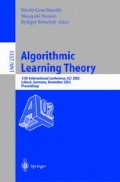Abstract
This paper studies α-CoAgnostic learnability of classes of boolean formulas. To α-CoAgnostic learn C from H, the learner seeks a hypothesis h ∈; H that agrees (rather than disagrees as in Agnostic learning) within a factor α of the best agreement of any f ∈; C. Although 1-CoAgnostic learning is equivalent to Agnostic learning, this is not true for α-CoAgnostic learning for 1/2 < α < 1.
It is known that α-CoAgnostic learning algorithms are equivalent to α- approximation algorithms for maximum agreement problems. Many studies have been done on maximum agreement problems, for classes such as monomials, monotone monomials, antimonotone monomials, halfspaces and balls. We study these problems further and some extensions of them. For the above classes we improve the best previously known factors α for the hardness of α-CoAgnostic learning. We also find the first constant lower bounds for decision lists, exclusive-or, halfspaces (over the boolean domain), 2-term DNF and 2-term multivariate polynomials.
This research was supported by the fund for promotion of research at the Technion. Research no. 120-025. Part of this research was done at the University of Calgary, Calgary, Alberta, Canada.
Access this chapter
Tax calculation will be finalised at checkout
Purchases are for personal use only
Preview
Unable to display preview. Download preview PDF.
References
E. Amaldi and V. Kann, The complexity and approximability of finding maximum feasible subsystems of linear relations, Theoretical Computer Science, 147: 181–210, 1995.
D. Angluin and P. D. Laird, Learning from noisy examples, ML, 2:343–370,1988.
M. Anthony and N. Biggs, Computational learning theory, Cambridge Tracts in Theoretical Computer Science 30, Cambridge University Press, 1992.
N. H. Bshouty, L. Burroughs. Bounds for the Minimum Disagreement Problem with Applications to Learning Theory. 15th COLT, 271–286, 2002.
S. Ben-David, N. Eiron, P. M. Long. On the difficulty of approximately maximizing agreement. 13th COLT, 266–274, 2000.
J. H↕astad, Some optimal inapproximability results, 29th STOC, 1–10, 1997.
D. Haussler, Decision theoretic generalizations of the PAC model for neural net and other learning applications. Inform. Comput., 100(1):78–150, Sept. 1992.
Klaus-U Höffgen, Hans-U. Simon and Kevin S. Van Horn, Robust trainability of single neurons, JCSS, 50(1): 114–125, 1995.
M. Kearns and M. Li, Learning in the presence of malicious errors, SIAM Journal on Computing, 22(4): 807–837, 1993.
M. Kearns, R. E. Schapire and L. M. Sellie. Toward efficient agnostic learning. 5th COLT, 341–352, 1992.
Y. Mansour, Learning Boolean Functions via the Fourier Transform. In Theoretical Advances in Neural Computation and Learning, (V. P. Roychodhury, K-Y. Siu and A. Orlitsky, ed), 391–424 (1994).
L. G. Valiant, A theory of the learnable, Comm. ofthe ACM, 27(11): 1134–1142, 1984.
V. Vapnik, A. Chervonenkis, On the uniform convergence of relative frequencies of events to their probabilities. Theory of Probability and its Applications, 16(2): 264–280, 1971.
Author information
Authors and Affiliations
Editor information
Editors and Affiliations
Rights and permissions
Copyright information
© 2002 Springer-Verlag Berlin Heidelberg
About this paper
Cite this paper
Bshouty, N.H., Burroughs, L. (2002). Maximizing Agreements and CoAgnostic Learning. In: Cesa-Bianchi, N., Numao, M., Reischuk, R. (eds) Algorithmic Learning Theory. ALT 2002. Lecture Notes in Computer Science(), vol 2533. Springer, Berlin, Heidelberg. https://doi.org/10.1007/3-540-36169-3_9
Download citation
DOI: https://doi.org/10.1007/3-540-36169-3_9
Published:
Publisher Name: Springer, Berlin, Heidelberg
Print ISBN: 978-3-540-00170-6
Online ISBN: 978-3-540-36169-5
eBook Packages: Springer Book Archive

